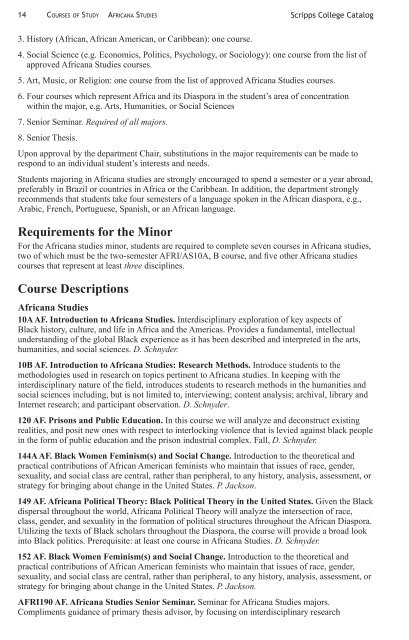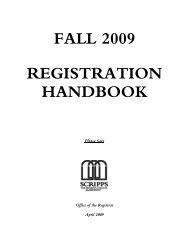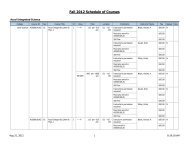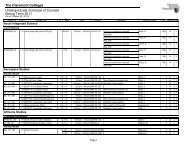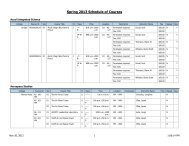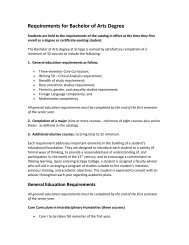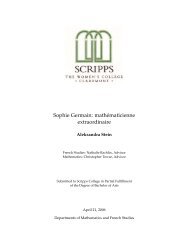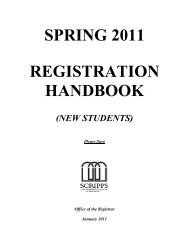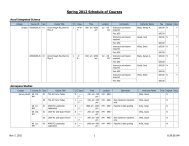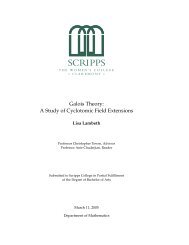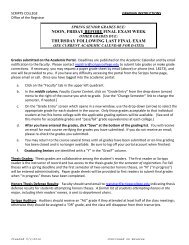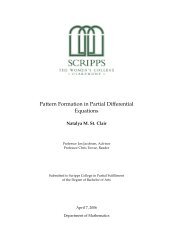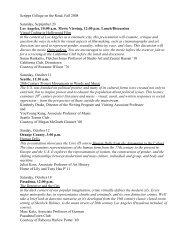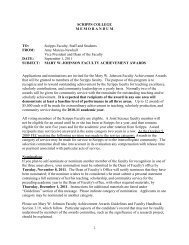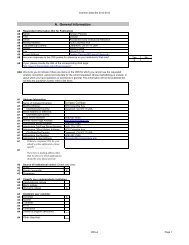PDF of the 2012-2013 Academic Catalog - Scripps College
PDF of the 2012-2013 Academic Catalog - Scripps College
PDF of the 2012-2013 Academic Catalog - Scripps College
Create successful ePaper yourself
Turn your PDF publications into a flip-book with our unique Google optimized e-Paper software.
14 Courses <strong>of</strong> Study Africana Studies <strong>Scripps</strong> <strong>College</strong> <strong>Catalog</strong><br />
3. History (African, African American, or Caribbean): one course.<br />
4. Social Science (e.g. Economics, Politics, Psychology, or Sociology): one course from <strong>the</strong> list <strong>of</strong><br />
approved Africana Studies courses.<br />
5. Art, Music, or Religion: one course from <strong>the</strong> list <strong>of</strong> approved Africana Studies courses.<br />
6. Four courses which represent Africa and its Diaspora in <strong>the</strong> student’s area <strong>of</strong> concentration<br />
within <strong>the</strong> major, e.g. Arts, Humanities, or Social Sciences<br />
7. Senior Seminar. Required <strong>of</strong> all majors.<br />
8. Senior Thesis.<br />
Upon approval by <strong>the</strong> department Chair, substitutions in <strong>the</strong> major requirements can be made to<br />
respond to an individual student’s interests and needs.<br />
Students majoring in Africana studies are strongly encouraged to spend a semester or a year abroad,<br />
preferably in Brazil or countries in Africa or <strong>the</strong> Caribbean. In addition, <strong>the</strong> department strongly<br />
recommends that students take four semesters <strong>of</strong> a language spoken in <strong>the</strong> African diaspora, e.g.,<br />
Arabic, French, Portuguese, Spanish, or an African language.<br />
Requirements for <strong>the</strong> Minor<br />
For <strong>the</strong> Africana studies minor, students are required to complete seven courses in Africana studies,<br />
two <strong>of</strong> which must be <strong>the</strong> two-semester AFRI/AS10A, B course, and five o<strong>the</strong>r Africana studies<br />
courses that represent at least three disciplines.<br />
Course Descriptions<br />
Africana Studies<br />
10A AF. Introduction to Africana Studies. Interdisciplinary exploration <strong>of</strong> key aspects <strong>of</strong><br />
Black history, culture, and life in Africa and <strong>the</strong> Americas. Provides a fundamental, intellectual<br />
understanding <strong>of</strong> <strong>the</strong> global Black experience as it has been described and interpreted in <strong>the</strong> arts,<br />
humanities, and social sciences. D. Schnyder.<br />
10B AF. Introduction to Africana Studies: Research Methods. Introduce students to <strong>the</strong><br />
methodologies used in research on topics pertinent to Africana studies. In keeping with <strong>the</strong><br />
interdisciplinary nature <strong>of</strong> <strong>the</strong> field, introduces students to research methods in <strong>the</strong> humanities and<br />
social sciences including, but is not limited to, interviewing; content analysis; archival, library and<br />
Internet research; and participant observation. D. Schnyder.<br />
120 AF. Prisons and Public Education. In this course we will analyze and deconstruct existing<br />
realities, and posit new ones with respect to interlocking violence that is levied against black people<br />
in <strong>the</strong> form <strong>of</strong> public education and <strong>the</strong> prison industrial complex. Fall, D. Schnyder.<br />
144A AF. Black Women Feminism(s) and Social Change. Introduction to <strong>the</strong> <strong>the</strong>oretical and<br />
practical contributions <strong>of</strong> African American feminists who maintain that issues <strong>of</strong> race, gender,<br />
sexuality, and social class are central, ra<strong>the</strong>r than peripheral, to any history, analysis, assessment, or<br />
strategy for bringing about change in <strong>the</strong> United States. P. Jackson.<br />
149 AF. Africana Political Theory: Black Political Theory in <strong>the</strong> United States. Given <strong>the</strong> Black<br />
dispersal throughout <strong>the</strong> world, Africana Political Theory will analyze <strong>the</strong> intersection <strong>of</strong> race,<br />
class, gender, and sexuality in <strong>the</strong> formation <strong>of</strong> political structures throughout <strong>the</strong> African Diaspora.<br />
Utilizing <strong>the</strong> texts <strong>of</strong> Black scholars throughout <strong>the</strong> Diaspora, <strong>the</strong> course will provide a broad look<br />
into Black politics. Prerequisite: at least one course in Africana Studies. D. Schnyder.<br />
152 AF. Black Women Feminism(s) and Social Change. Introduction to <strong>the</strong> <strong>the</strong>oretical and<br />
practical contributions <strong>of</strong> African American feminists who maintain that issues <strong>of</strong> race, gender,<br />
sexuality, and social class are central, ra<strong>the</strong>r than peripheral, to any history, analysis, assessment, or<br />
strategy for bringing about change in <strong>the</strong> United States. P. Jackson.<br />
AFRI190 AF. Africana Studies Senior Seminar. Seminar for Africana Studies majors.<br />
Compliments guidance <strong>of</strong> primary <strong>the</strong>sis advisor, by focusing on interdisciplinary research


